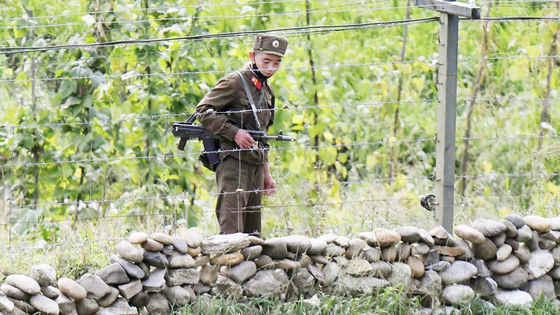While the South Korean government has recently highlighted a “rush of high-level defections” prompted by media outreach and loudspeaker broadcasts to North Korea, fewer ordinary North Koreans have defected. As a result, experts suspect that defections may have “polarized.”
The seeming increase in the proportion of elite defectors is also due to a decrease in the overall number of defectors, a point the South Korean government is overlooking.
A total of 196 North Korean defectors entered South Korea last year, according to the Unification Ministry.
“Of these, about 10 are members of the elite class, the largest number since 2017,” a Unification Ministry official said during a briefing last January.

The South Korean government is actively capitalizing on the recent news that Ri Il-gyu, a counselor at the North Korean Embassy in Cuba, defected last November. The military has been conducting psychological warfare against North Korea by broadcasting the news of Ri’s defection through loudspeakers in response to North Korea’s continued launches of waste balloons.
But there’s an inconvenient truth that the South Korean government overlooks.
According to multiple sources contacted on Monday by the JoongAng Ilbo, an affiliate of the Korea JoongAng Daily, about 11 elite North Korean defectors entered South Korea last year.
The Unification Ministry said the number was 10 and declared it the highest in six years, but according to the sources, elite North Korean defectors totaled 10 in 2019 as well.
![South Korean soldiers work in front of a truck believed to be a mobile loudspeaker at the Paju border crossing on June 10. [NEWS1]](https://koreajoongangdaily.joins.com/data/photo/2024/07/24/a5e1a439-abbd-45f6-b294-0396b8dd97e8.jpg)
“It’s not that all 10 who entered in 2019 were elite defectors themselves, but to be precise, they were three families of elite defectors,” a source told the JoongAng Ilbo on Monday. ”And the 11 or so who entered last year may have consisted of two or three families, too.”
Meanwhile, the number of defections by ordinary North Koreans who entered South Korea has dropped significantly, with the total number of defections plummeting from 1,047 in 2019 to 196 last year.
The South Korean government claims the number of high-level defections has increased, but those numbers have remained steady. What has increased is the share of the elite defectors among the total number of defectors, from 0.95 percent in 2019 to 5.6 percent in 2023.
This is mainly due to the border closures caused by the Covid-19 pandemic and the subsequent crackdown by North Korean leader Kim Jong-un, which have made it harder for ordinary people to defect.
Experts even warn that defections are growing polarized, but the South Korean government simply trumpets the “increase” in elite defections.
![Ri Il-gyu, a former counselor at the North Korean Embassy in Cuba,who defected to South Korea in November last year, speaks during an interview with local press on Monday. [YONHAP]](https://koreajoongangdaily.joins.com/data/photo/2024/07/24/1524c52e-96c6-4950-b542-af83359ab748.jpg)
Despite recent reports of “elite defections,” the Unification Ministry and the National Intelligence Service (NIS), which are in charge of protecting and resettling North Korean defectors, have refused to provide specific figures on the number of elite defectors entering the country, citing the “safety of the defectors.”
In reality, elite North Koreans are more likely to succeed in defecting than the general population, given their different living and financial conditions. Elite defectors also often defect from overseas, where there is less centralized control.
North Korea erected barbed wire fences along the North Korea-China border to prevent defections, and in some areas, it installed high-voltage lines and even laid land mines. As a result, experts believe that defections are unlikely to return to pre-pandemic levels for some time.
![A wire fence is seen along the Tumen River in China's northeastern Jilin province on Aug. 31, 2020. [YONHAP]](https://koreajoongangdaily.joins.com/data/photo/2024/07/24/f8fa4319-152d-4f87-b653-3302e1c6cde6.jpg)
Even in the process of defecting, people from better social or financial backgrounds, such as diplomats and North Koreans studying overseas, enjoy a kind of privilege.
Although high-level defectors can be a valuable intelligence asset for analyzing North Korea, experts worry that the South Korean government’s approach seemingly focuses only on elite defections.
They say the government should more actively support ordinary North Koreans and respond to forced repatriations.
“From a national interest perspective, it is natural for the South Korean government to focus on managing defectors from the elite,” said Lee Young-hwan, head of the Transitional Justice Working Group, a Seoul-based civic group. ”But it should also pay more attention to creating conditions to enable ordinary people persecuted by the North Korean regime to defect safely.”
BY CHUNG YEONG-GYO,LEE YOO-JUNG,LIM JEONG-WON [lim.jeongwon@joongang.co.kr]



![Ex-South Korean President Accused of Trying to Trigger North Korean Attack Former President Yoon Suk Yeol leaves the Seoul Central District Court in southern Seoul after the pretrial detention hearing on July 9. [JOINT PRESS CORPS]](https://www.koreadailyus.com/wp-content/uploads/2025/07/0710-Yoon-100x70.jpg)
